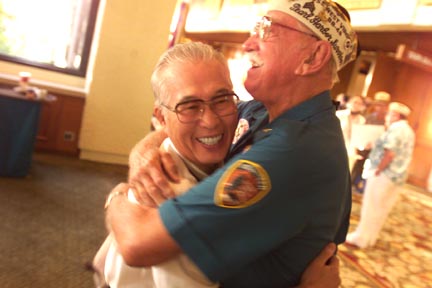
[ DICK FISKE / 1922-2004 ]
STAR-BULLETIN / 2001
Pearl Harbor vet Dick Fiske, right, greets Japanese Zero pilot Jun Tanaka before a ceremony at the Hilton Hawaiian Village.
Pearl Harbor veteran
bridged the ocean to
forge friendship with
former enemies
Dick Fiske and Zenji Abe became enemies in the winter of 1941.
In that year, on Dec. 7, Abe flew his Japanese Zero over Pearl Harbor and dropped several bombs. One of them hit the USS West Virginia. On the battleship's deck that morning stood Fiske, a Marine bugler who had just finished playing "To the Colors" when the attack began.
Fiske held a hatred for the harbor's attackers for decades afterward, blaming them -- rather than their commanders -- for the deaths of his friends and fellow soldiers in a raid that threw the United States into World War II.
But in 1991, 50 years after the Japanese strike on one of the U.S. Navy's most strategic Pacific ports, Fiske met Abe at a reunion for World War II veterans and gave him a bear hug. The gesture was the kickoff to what would become a longtime friendship.
"He figured that it was about time for closure," said Herb Weatherwax, Fiske's friend and a fellow volunteer at the USS Arizona Memorial visitors center. "We can not go on through life bearing resentment."
Fiske, who has been chronicled in several books and articles for his work in trying to build bonds between Japanese and American veterans of World War II, died Friday at his Honolulu home. He was 82.
"I don't want to say anything bad about him because I don't know anything bad about him," said Bob Kinzler, a World War II vet who has known Fiske for almost 20 years.
"He just had a heart that was a forgiving one. For a number of years, he was rather resentful, but eventually he learned you could forgive and forget and feel better."
After Fiske and Abe met in the early 1990s, the two began a tradition. Abe would send his friend $500 a year to buy roses. And in a one-man ceremony monthly, Fiske would place the flowers at the Arizona Memorial and play taps to his fallen comrades.
The tribute was going strong up until early this year, when Fiske's cancer began to take a greater toll on him.
"We'll be missing him," Weatherwax said. "He was one of the cherished members of the Pearl Harbor survivors."
Fiske, born in Boston, enlisted in the U.S. Marine Corps in February 1940. By July he was aboard the USS West Virginia. Fiske remained assigned to the ship, which was salvaged from Pearl Harbor's bottom after the 1941 raid, for four years.
After World War II, Fiske went into the U.S. Air Force and served in the Korean and Vietnam wars. He was stationed at Hickam Air Force Base in the late 1960s and chose to stay in the islands after his retirement in 1973.
Fiske began volunteering at the Arizona Memorial in 1982. Shortly after, he started reaching out to Japan's World War II veterans, hoping the work would help him come to terms with what he had seen and done during the war.
In his narrations at the memorial, Fiske also tried to emphasize the good relations between the United States and Japan.
"We have to make peace with ourselves," Weatherwax said. "Really, it was not the individuals that are the ones who were the enemies. We had to follow orders."
Fiske's pursuit drew accolades at home and abroad. In 1996 he received the Order of the Rising Sun with Silver Rays from the Japanese emperor.
Fellow vets also say Fiske, whose face visitors often recognized from documentaries on the Pearl Harbor attack or books about the event, was something of a celebrity at the memorial.
The exposure meant a steady stream of fan mail. Fiske's son, Richard, said the vet got an average of five letters a day ranging from tourists thanking him for a memorial tour to teachers asking him to talk to their students.
"He had a big heart," Kinzler said, "and he made friends easily and he had some air about him that sort of drew people."
"He took great delight in talking to people," Kinzler added. "He was always with a crowd around him."
Besides his son, Fiske is survived by his wife, Carmen, and two daughters, Peggy Bundek and Ginny Kawamura. Services are pending.
— ADVERTISEMENTS —
— ADVERTISEMENTS —
